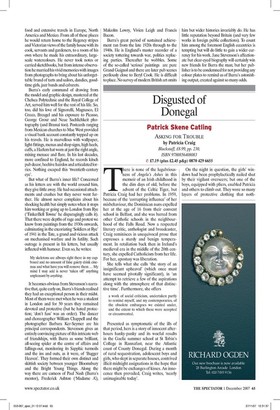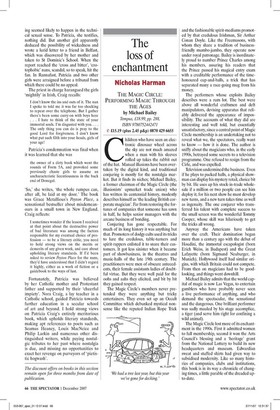Disgusted of Donegal
Patrick Skene Catling ASKING FOR TROUBLE by Patricia Craig Blackstaff, £8.99, pp. 230, ISBN 9780856408083 © £7.19 (plus £2.45 p&p) 0870 429 6655 There is none of the lugubriousness of Angela's Ashes in this memoir of an Irish childhood in the dim days of old, before the advent of the Celtic Tiger, but Patricia Craig had her problems. In 1959, because of the 'corrupting influence' of her misbehaviour, the Dominican nuns expelled her at the age of 16 from their convent school in Belfast, and she was barred from other Catholic schools in the neighbourhood of the Falls Road. Now a respected literary critic, anthologist and broadcaster, Craig reminisces in unequivocal prose that expresses a sturdy and benign temperament. In retaliation back then in Ireland's medieval era in the middle of the 20th century, she expelled Catholicism from her life. For her, apostasy was liberation.
She tells what she calls 'the story of an insignificant upheaval' (which once must have seemed pivotally significant), in 'an attempt to retrieve a few of the aspirations along with the atmosphere of that distinctive time'. Furthermore, she offers a work of social criticism, undertaken partly to remind myself, and my contemporaries, of the obsolete embargoes we existed under, and the extent to which these were accepted or circumvented.
Presented as symptomatic of the ills of that period, hers is a story of innocent afterhours hanky-panky and its woeful results in the Gaelic summer school at St Tobin's College in Rannafast, near the Atlantic coast of County Donegal. During a month of rural sequestration, adolescent boys and girls, who slept in separate houses, contrived illicit midnight assignations in the hope that there might be exchanges of kisses. An innocence then prevailed, Craig writes, 'nearly unimaginable today'.
On the night in question, the girls' windows had been prophylactically nailed shut by their vigilant overseers; but one of the boys, equipped with pliers, enabled Patricia and others to climb out. They wore so many layers of protective clothing that nothing seemed likely to happen in the technical sexual sense. To Patricia, she testifies, nothing did. But another girl apparently deduced the possibility of wickedness and wrote a lurid letter to a friend in Belfast, which was discovered by her mother and taken to St Dominic's School. When the report reached the 'cross and bitter', `erotophobic' nuns, scandal, so to speak, hit the fan. In Rannafast, Patricia and two other girls were arraigned before a tribunal from which there could be no appeal.
The priest in charge harangued the girls 'mightily' in Irish, Craig recalls: I don't know the ins and outs of it. The nun I spoke to told me it was far too shocking to repeat over the telephone. But I gather there's been some carry-on with boys here . . . I hate to think of the state of your immortal souls. I'm disgusted with you. . . . The only thing you can do is pray to the good Lord for forgiveness. I don't know what put such filth into your heads, girls of your age!
Patricia's condemnation was final when it was learned that she was the owner of a dirty book which went the rounds of Form 5A, and provoked some previously chaste girls to assume an uncharacteristic licentiousness in the back end of Donegal.
'So,' she writes, 'the whole rumpus can, after all, be laid at my door.' The book was Grace Metallious's Peyton Place, a sensational bestseller about misdemeanours in a small town in New England. Craig reflects: I sometimes wonder if the lesson I received at that point about the destructive power of bad literature was among the factors responsible for my eventual choice of profession — to be a literary critic, you need to hold strong views on the merits or demerits of any given work, and care about upholding literary standards. If I'd been asked to review Peyton Place for the nuns, they'd have understood that I didn't regard it highly, either as a work of fiction or a guidebook to the ways of lust.
Fortunately, Patricia was believed by her Catholic mother and Protestant father and supported by their 'cheerful impiety'. Nora Craig, a lay teacher in a Catholic school, guided Patricia towards further education in a secular school of art and beyond. I hold strong views on Patricia Craig's entirely meritorious book, which upholds literary standards, making apt references to poets such as Seamus Heaney, Louis MacNeice and Philip Larkin and numerous other distinguished writers, while paying nostalgic tributes to her past where nostalgia is due, and missing no opportunities to exact her revenge on purveyors of 'pietistic hogwash'.
The discount offers on books in this section remain open for three months from date of publication.






































































 Previous page
Previous page